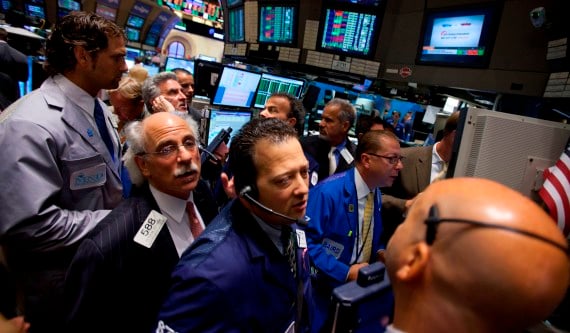Harder to make transaction fees without transactions
Back in August, when the broad stock market began its intense roller coaster ride, executives at small to midsize independent broker-dealers feared that trading volumes would dwindle as retail clients headed for the hills.
If pending third-quarter results from Wall Street investment houses, including industry giant The Goldman Sachs Group Inc., are any indication, those worries were well-founded.
According to a report issued Thursday from a Barclays Capital research team that keeps tracks of U.S. brokers, asset managers and exchanges, the third quarter, which ends next Friday, could prove to be punishing for the big firms.
“As we approach the end of the 3Q, we struggle to find any broker-dealer businesses reporting positively trending results,” wrote the team, which is led by analyst Roger Freeman. “Nearly every line is being marked down from our prior forecasts, which were not particularly optimistic to begin with, having been at or near Street lows when we updated estimates in July after 2Q earnings.”
Indeed, weak equity markets are Goldman's “Achilles' Heel,” Mr. Freeman noted.
The third quarter has been so tough that Goldman is on the verge of recording a loss, according to Mr. Freeman. Previously, he predicted that Goldman would see a profit of $2.40 per share in the third quarter. His new estimate has Goldman recording a loss of 35 cents.
If that happens, it will be only the second time in the storied firm's history it publicly reported a loss. The other was in the darkest days of the credit crisis, when the firm lost $4.97 per share in the final three months of 2008, Mr. Freeman noted.
But his outlook is not all gloom and doom. Both Goldman and rival Morgan Stanley are in better positions than their valuations suggest, particularly once the current storm passes and clients need their services, Mr. Freeman noted.
Goldman Sachs spokesman Stephen Cohen declined to comment. Goldman Sachs releases its earnings Oct. 18.
Of course, giant investment banks such as Goldman Sachs and Morgan Stanley rely on streams of revenue such as underwriting mergers and acquisitions, and principal trading, to generate cash and create profits.
Those businesses are ones that independent broker-dealers mainly avoid. Many independent reps primarily sell packaged products such as mutual funds and variable annuities to retail clients, and the dependence on those products should cushion the blow somewhat from the continuing market volatility.
But both investment banks and retail-focused broker-dealers rely heavily on investor confidence to generate transaction volume, which in turn generates revenue.
And there is no denying the pain for clients of the past few months. Since June, the S&P 500 has dropped 11.3%.
One positive note: Independent broker-dealers that are able to recruit new brokers in the face of market volatility can effectively replace some of the revenue that market declines eat up.
For example, Geneos Wealth Management Inc. “had a pretty good first half of the year and, with recruiting, still more than likely to be ahead of 2010 when the dust settles,” said CEO Russ Diachok. The firm has about 280 reps and saw total revenue in 2010 of $74.1 million. Through the end of August, the firm saw revenue running 28% ahead of the comparable period last year.
No doubt, the market seesaw is scaring investors, he said. “The new money going into equity market will probably be slow going.”







